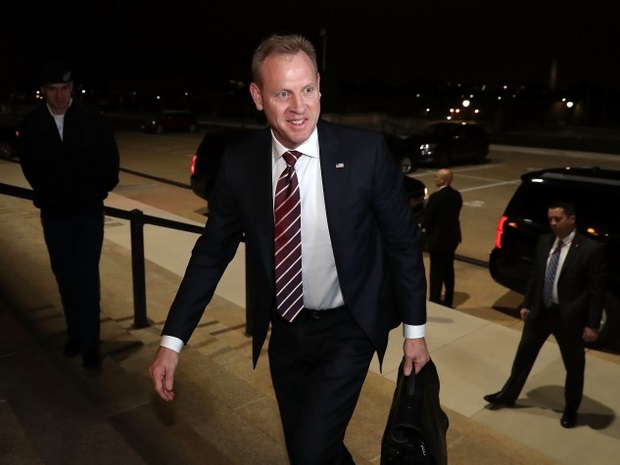Shanahan Latest Industry Insider With Cabinet-Level Power
- Former business officials now lead four executive agencies
- Appointees subject to conflict-of-inerest and ethics laws
Patrick Shanahan, President Donald Trump’s temporary Pentagon chief, is the latest in a series of executive branch appointees with deep ties to the industries they oversee.
Before becoming an assistant defense secretary, Shanahan had been vice president of supply chain and operations at Boeing Co., which sells more than $20 billion worth of jets, equipment and services to the federal government each year, making it No. 2 on the BGOV 200 of top contract recipients.
He already had agreed to stay out of decisions that would impact his former employer before stepping up following the resignation of Jim Mattis.
Such recusal agreements pose their own challenges, said Danielle Brian, executive director of the Project on Government Oversight. “Yes, he should recuse himself. But then I think it has a real impact on how he can do his job well. So that’s why the revolving door matters,” she said.

Other administration officials are either temporarily or permanently running the Environmental Protection Agency, the Interior Department, and the Department of Health and Human Services.
Acting Interior Secretary David Bernhardt has so many potential conflicts of interest that he carries a card listing all of them, the Washington Post reported.
“What I’ve seen historically, has been people who have been heads of agencies leaving to become lobbyists for those industries,” Brian said, “But I can’t think of a time where we’ve had this circumstance where so many industry representatives are now running agencies that regulate or give billions of dollars in contracts to those industries.”
‘It’s Navigable’
It is legal for former lobbyists or high-level industry executives to take government jobs that could have an impact on their former employers. They must abide by ethics rules and a federal conflict of interest statute.
“We see this scenario all the time and it is typically navigable,” said Elliot Berke, a compliance lawyer who has represented Cabinet-level political appointees during their confirmations. Officials at the Office of Government Ethics “work diligently with us as private counsel to make certain proper ethical guardrails are put into place,” he said, adding that the waivers exempting recusals are sparingly issued.
Bernhardt, an Interior Department lawyer under President George W. Bush, joined the Trump administration from the law and lobbying firm Brownstein Hyatt Farber Schreck. His most recent clients included Westlands Water District in central California, which sued the Interior Department over a toxic irrigation drainage dispute.
He also represented Toronto-based Hudbay Minerals, a company that has proposed to build a controversial copper mine in Arizona. Bernhardt previously represented Cobalt International Energy and Samson Resources Company.
Former lobbyist Andrew Wheeler, the EPA’s acting administrator, worked at Faegre Baker Daniels from 2009 until he entered the Trump administration in 2017. His client list included uranium mining company Energy Fuels Resources Corporation, Xcel Energy and coal company Murray Energy. Wheeler also has experience at the agency working for both Bush administrations and for Sen. Jim Inhofe (R-Okla.).
Corporate Experience
The head of the Department of Health and Human Services, Alex Azar, was president of drug giant Eli Lilly & Co.‘s U.S. operations from 2012 until January 2017. His responsibilities included overseeing the company’s advocacy strategy. Azar reported receiving a $2 million salary — including bonuses — and a $1.6 million severance from the company in his 2017 personal financial disclosures submitted after Trump nominated him.
Azar promised to recuse himself from participating “personally and substantially in any particular matter involving specific parties in which I know that entity is a party or represents a party” for one year, unless he received an ethics waiver. That year-long cooling-off period has expired.
Nick Allard, a senior counsel in the public policy and regulation practice at Dentons and former dean of Brooklyn Law School, said that experience in the corporate world or as a lobbyist shouldn’t disqualify someone from becoming a government decision-maker. It can be beneficial to have someone in government who understands “the issues, the substance of regulated sectors,” he said.
“The relevant questions are whether the official is qualified and whether she or he can be objective,” he said. “That is, will they be free of bias and put the national interest ahead of their personal interest.”
During the previous administration, about 70 waivers were issued over eight years to let former lobbyists take executive-branch jobs despite President Barack Obama’s ban on hiring registered lobbyists. Sixteen of those were granted to White House officials.
`Empty Rhetoric’
In a 2017 report, Public Citizen’s Craig Holman found that 133 of Trump’s political appointees were former lobbyists, or about a fourth of the president’s picks analyzed in the study.
“Trump’s pledge to drain the swamp was nothing more than empty campaign rhetoric,” said Holman, a lobbyist for the watchdog group.
To contact the reporter on this story: Megan R. Wilson in Washington at mwilson@bgov.com
To contact the editors responsible for this story: Katherine Rizzo at krizzo@bgov.com; Bennett Roth at broth@bgov.com; Heather Rothman at hrothman@bgov.com